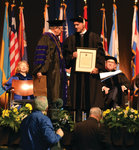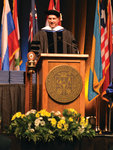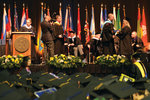By JACOB MARROCCO At 32 years old, the title of doctor" seemed impossible to Chris Herren. The Fall River basketball legend received an honorary doctor of humane letters degree during the New England Institute of Technology's 78th commencement ceremony"
This item is available in full to subscribers.
We have recently launched a new and improved website. To continue reading, you will need to either log into your subscriber account, or purchase a new subscription.
If you are a current print subscriber, you can set up a free website account by clicking here.
Otherwise, click here to view your options for subscribing.
Please log in to continue |
|






At 32 years old, the title of “doctor” seemed impossible to Chris Herren.
The Fall River basketball legend received an honorary doctor of humane letters degree during the New England Institute of Technology’s 78th commencement ceremony on Sunday morning at the Dunkin’ Donuts Center in Providence.
Herren served as commencement speaker and told the 1,130 graduating students his story of drug abuse, relapse and redemption.
Herren, who is now 43, will celebrate 11 years of sobriety on Aug. 1. He described, in detail, a drug addiction that lasted nearly 15 years and almost cost him his family.
“By the grace of God, one day at a time, Aug. 1, 2008, is still my sobriety date,” he said. “I thank God every day for that man’s words. I thank God for all the bad days. The bad days become the blessings, and the beauty of living life in sobriety, eventually you find the silver lining in all your sad stories.”
Now, he runs the nonprofit Herren Project, which has given out more than $3 million in treatment scholarships and assisted more than 5,000 families. His recovery, which he calls his greatest accomplishment, has allowed him to see “the bad days become the blessings.”
Herren told the graduates that their work doesn’t end with graduation, and that they must continue to push themselves and set greater expectations.
“Can you continue to work hard, set new goals and challenge yourself daily to be better than the day before?” he said. “Make a commitment to inspire. Share your gift with others and don’t ever give up on your dream, because trust me, it’s never too late to live it. As I look out in front of me, in a sea of caps and gowns, I see grit. I see resiliency. You wouldn't be here without it.”
Herren wouldn’t have been standing on the stage without some grit and resiliency of his own.
He has faced his share of hardships, beginning decades ago with a promising future ahead of him. He said the wooden basketball hoop in his driveway became an escape as a child, a place where time melted away as he put up jumper after jumper. He was a top-20 basketball player in the country at the age of 18 and committed to play basketball at Boston College.
Then, he walked into his dorm room one day and there was a line of cocaine on his desk. He said he promised himself he would indulge just once, but it evolved into an addiction.
“That one line took 14 years to walk away from,” Herren said. “That one line got me expelled from Boston College four months later. And that one line followed me 3,000 miles away to Fresno State University, where I got my second chance. And that one line of cocaine landed me in a treatment center at 21 years old for severe cocaine addiction.”
As a child, Herren dreamed that he would play for the Boston Celtics, and it eventually came true. One year after being drafted 33rd overall by the Denver Nuggets, he was traded to his hometown team.
The elation, however, would be short-lived.
He said four months after the trade, he discovered the painkiller medication OxyContin. What started as $20 for milligrams turned into a $25,000-per-month habit with Herren taking 1,600 milligrams a day. That, in turn, led to a seven-year heroin addiction.
A turning point came at 32 years old, when Herren – then a father of two with a third child on the way – went from Portsmouth, Rhode Island, to Fall River to purchase heroin. He suffered his fourth overdose and awoke in the back of an ambulance on the way to his hometown hospital.
He was discharged shortly after with one thing on his mind.
“At 32 years old, as I was walking out of that hospital, the only thing I could think to do was to commit suicide,” he said. “And as I’m walking out thinking about ending my life, this nurse yelled my name and she said, ‘Come back here, I knew your mother.’ My mom died from cancer at a young age. I said, ‘No disrespect to you ma’am, but please don't talk about my mom.’ She said, ‘No disrespect to you, your mom is talking to me right now.’”
The nurse found him a bed in the hospital for eight days, and just after Herren was discharged, former teammate Chris Mullin approached him outside the hospital. Mullin told Herren he had “found a place” that was willing to take Herren in, and he checked into a treatment center in New York. Mullin urged him to “take our family’s gift and get your family back.”
He was told he could not contact his family for 30 days, and after that time period was up, he immediately called his wife.
“Nervous and anxious, I walked in to call home and my wife answered the phone and she was crying,” Herren said. “She said, ‘I don’t want to tell you this, but I’m in the hospital right now. I’m going to give birth to our son today.’ She said, ‘The saddest thing is, there’s nobody here to help me. Everybody, they’re embarrassed or mad at me. Do you think you can come home, just for the day? I don’t want to do this alone.’”
He made it back to Rhode Island in time to witness the birth of his son, Drew, and he said he stared at him for as long as he was allowed. His two other children – 9-year-old Christopher and 7-year-old Samantha – visited a few hours later, and he recalled an exchange with his son.
“Christopher hugged me, looked up at me and said to me, ‘I miss you, dad. I don’t want drugs to kill you, dad. I want you to be my dad,’” Herren said.
Herren, with tears streaming down his face, handed Drew back to his wife and told her he was going for a walk. He relapsed and did not return until the next morning, where his wife told him he was never going to see his kids again.
Herren’s wake-up call came after returning to the rehab facility in New York. His counselor hugged him and told him he was going to call his wife and promise he would never contact her again.
“‘You’re going to ask your wife to sit down with your three children and explain to her three children that when their daddy said goodbye in the hospital that morning, that their daddy died in a car accident,’” Herren recalled the counselor saying. “‘I want you to play dead for your family, because you’re a no-good … junkie who doesn’t deserve to be a dad.’”
He said he could not make the phone call, and walked back to his room in the treatment center. He fell to his knees and started praying on a date he’ll never forget – Aug. 1, 2008.
“You become extremely grateful for your worst moments,” Herren said. “You forgive and you allow yourself to be forgiven. I believe I was presented with this opportunity, not only because of my past but because of the man I am today.”
Herren and Donald R. Sweitzer, former chairman of International Game Technology, received honorary doctorates from NEIT, which has two campuses in Warwick. Former Warwick mayor and current Rhode Island Supreme Court Justice Francis Flaherty and current Warwick Mayor Joseph Solomon were among those in attendance.
Comments
No comments on this item Please log in to comment by clicking here